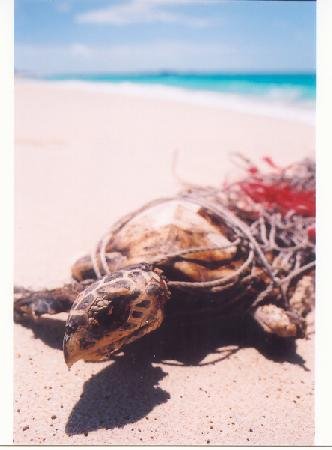What is the Problem?
Nearly all (90%) of the marine debris entering the coastal regions of northern Australia is of a fishing nature and originates from all parts of South East Asia. For the most part the nets arrive during the monsoonal season from November to March (red arrows) but on the western shores of the Gulf of Carpentaria the nets get swept in during the south east trade winds mainly between May – September (blue arrows). The reason is because the Gulf experiences a circular current or gyre similar to that which has created the large island mass of rubbish in the NW Pacific Ocean.
Context in which we work – “Caring for Country”
 “The Ghost Net Project is for people from (Indigenous) communities to find ways to work together to get rid of marine debris in their sea country.” Djawa Yunupingu, Dhimurru.
“The Ghost Net Project is for people from (Indigenous) communities to find ways to work together to get rid of marine debris in their sea country.” Djawa Yunupingu, Dhimurru.
We are working in an environment that is extremely remote and unpopulated with areas difficult to access by land. The people are mostly Indigenous scattered in isolated pockets, some in townships created by the establishment of mines and the rest in homelands. This means they have culturally diverse backgrounds and a wide range in their capacity to do things but they all aspire to have greater influence on the management of their coastal resources including threats to those resources. Ghost Net work is but a small part of the larger “Caring for Country” activities that are performed by rangers and community organisations across the whole northern Australia.
Caring for Country is best summed up by a team of medical researchers in their publication:
For Indigenous peoples, “country” encompasses an interdependent relationship between Indigenous peoples and their ancestral lands and seas. [Burgess, CP 2008] “Country is multi-dimensional – it consists of people, animals, plants, Dreamings; underground, earth, soils, minerals and waters, air. . . People talk about country in the same way that they would talk about a person: they speak to country, sing to country, visit country, worry about country, feel sorry for country, and long for country.” [Rose D. 1996]
“Caring for country” means participating in interrelated activities on Aboriginal lands and seas with the objective of promoting ecological, spiritual and human health. It is also a community driven movement towards long-term social, cultural, physical and sustainable economic development in rural and remote locations, simultaneously contributing to the conservation of globally valued environmental and cultural assets. [Morrison J, 2007]
For more information – check out the Ghost Nets facebook page
